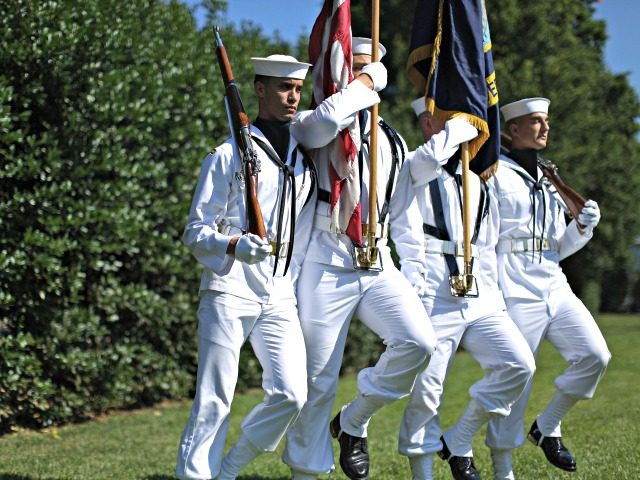Navy slides used to train its personnel on “extremism” encouraged sailors and Navy civilians to report on their colleagues if they saw indicators of “suspected or actual extremist behaviors.”
The slides, dated February 21 and obtained by Breitbart News, are to help the Navy fulfill Defense Secretary Lloyd Austin’s call for a one-day stand-down in the military to discuss “extremism.”
One slide said: “Everyone has a duty to report suspected or actual extremist behaviors. Early identification is key to effective intervention. What are some indicators of extremist ideologies?” There were no indicators listed.
Nonetheless, the slide encouraged sailors to report indicators of extremist ideologies to their chain of command, a person designated as Command Managed Equal Opportunity (CMEO), the Navy’s Insider Threat Program Office, the Equal Employment Opportunity, NCIS, or the Command Security Manager.
The slides do not explicitly define what “extremism” is. The Pentagon’s unwillingness to date to define explicitly what it considers “extremism” has caused anxiety among some service members that Austin’s efforts to root out “extremism” is aimed at conservatives or supporters of former President Donald Trump. The Pentagon has insisted the stand-down is not part of a political litmus test.
Another slide defines an “extremist group” as:
…an organization that espouses supremacist causes; attempts to create illegal discrimination based on race, creed, color, ethnicity, national origin, sex [includes gender identity], sexual orientation, or religion; advocates using force or violence; or otherwise engages in efforts to deprive individuals of their civil rights.
The slide also noted: “The DOD does not maintain a list of ‘prohibited organizations,'” but said, “Extremist groups advocate use of illegal means in espousing a wide variety of causes and ideologies. Supremacist groups are only a subset of extremist groups.”
On a slide titled: “Key Concepts and Definitions” it listed a definition for “supremacism” only. It said while there is no DOD or Navy definition of “supremacism,” dictionaries typically define it as “a belief that a particular group, especially one determined by race, religion, or sex, is superior and should therefore dominate society (e.g. KKK, neo-Nazis).”
Some Democrats have claimed that the January 6 protests were conducted by white supremacists.
In addition, the slides listed as prohibited conduct:
…offensive jokes, slurs, epithets or name calling, physical assaults or threats, intimidation, ridicule or mockery, insults or putdowns, offensive objects or pictures, and interference with work performance regardless of the means of communication (oral, written, e-mail, text messages, social media, etc.).
The slides say potential consequences for service members and civilians include separation from the military and removal. They also warn of consequences for obtaining security clearances.
The slides also reminded sailors to remain “apolitical.” One slide said:
Our Military is Apolitical | Non-Political
The military as an institution is only effective if we have the trust of the public.
Our Constitution firmly establishes that the military is subordinate to civilian leadership — regardless of political party.
Therefore, we are an APOLITICAL (non-political) institution and must remain vigilant in preserving our reputation as an APOLITICAL (nonpolitical) body
And the slides recommended against posting, retweeting, liking, or participating in online chats or forums on partisan political topics.
However, the slides said it is authorized for sailors to talk about Black Lives Matter as long as the behavior is otherwise legal and not “politically partisan” in nature. One slide said:
Q: My boss is always talking about Black Lives Matter. Isn’t that political stuff that they’re not supposed to be talking about at work?
A: Advocating for or against a public policy issue (as here) is authorized as long as the behavior is otherwise lawful and the advocacy is not politically partisan in nature (e.g. it doesn’t specifically address a political party). If the discussions make you uncomfortable, discuss the matter with your boss or another supervisor.
In a clear reference to the January 6 protests at the Capitol, where some Trump supporters engaged in violence, a slide said, “storming a police barrier” is not an exercise of First Amendment rights. It said:
All possess First Amendment rights of free exercise of religion, freedom of speech, and peaceful assembly. These rights are not unlimited.
- Speech that incites violence or criminal activity is not protected.
- Vandalizing government property and storming a police barrier is not an exercise of First Amendment rights.
- Similarly, speech in the workplace that interferes with the mission, espouses extremist or discriminatory doctrine, or is disrespectful and harmful to colleagues, will have consequences.
A second slide also appears to reference January 6, although the wording is vague. It said:
Q: If there have been issues with extremism inside the Department of Defense for a long time, why is the Secretary of Defense so focused on this now?
A: The increased level of domestic protests around the country in the past several months has emboldened some violent extremist groups to take more aggressive anti-government and racially motivated actions. These groups are known to actively target current and former military personnel. In light of current events, the Secretary wants DoD personnel at all levels to understand the threat and be trained and educated to take appropriate actions when they see indicators of extremism.
Extremism in the Ranks Stand-down Supplementary Training Slides by Kristina Wong on Scribd
Follow Breitbart News’s Kristina Wong on Twitter or on Facebook.

COMMENTS
Please let us know if you're having issues with commenting.